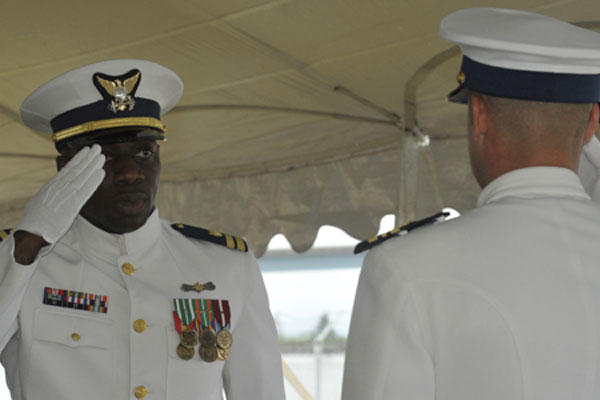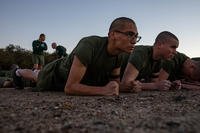Success is defined differently for everybody, but for one Coast Guardsman – who started his enlistment as a young, untested seaman recruit and is now the commanding officer of a small-boat station – success was constructed by a goal he set for himself when he was only two years into his career.
More than 16 years ago, 22-year-old Seaman Commander K. Moore stood shoulder-to-shoulder with his shipmates on the lawn of Station Atlantic City, N.J., watching his new commanding officer take an oath of leadership. Moore could not help but stare at the crisp, bright white dress uniforms worn by the officers in the ceremony. Although he graduated from basic training nearly two years earlier, it was his first time seeing a formal military change of command.
Up until this point, Moore, who grew up in Harlem, N.Y., could not have guessed what his future would hold. Before he joined the Coast Guard, the freedom of his first car left him missing too many classes and eventually out of college living back at home with his mother. He found work at a clothing store in New York City but wanted a career he could be proud of.
He joined the Coast Guard and after graduating from basic training began his career in Atlantic City as a non-rate, the Coast Guard’s lowest enlisted job position. Reporting to a unit after basic training as the newest crewmember can be difficult. Despite this challenge, his work ethic set the foundation needed to build a successful Coast Guard career.
As Moore stood in formation at Atlantic City, an idea engulfed his mind. Moore was determined to earn the white uniform; he gave himself eight years to become an officer.
For an enlisted member of the Coast Guard, becoming a commissioned officer can be difficult. The process requires a member to complete numerous forms, fulfill prerequisites and put together a package of credentials that can take months to complete. Though difficult, it is not impossible. In 2003, as a 2nd class food service specialist, with just under eight years as an enlisted service member behind him, Moore went to Officer Candidate School where he earned his commissioning.
Even after accomplishing his goal and serving a few tours as an officer, Moore could not have predicted how meaningful the accomplishment was to become. It wasn’t long before Moore received orders to be the commanding officer of Station Atlantic City. During the station’s change of command ceremony, with his new crew watching from formation, Moore, standing in his crisp, white dress uniform, became emotional as he read his orders out loud.
“I got choked up when they said ‘introducing the commanding officer of Coast Guard Station Atlantic City,’” Moore recalls.
His career had come full circle. He said he would have never, ever expected to be back at the station where his career began, especially as the commanding officer.
Although he is now in charge, Moore takes pride in always being the same person regardless of his rank. Nobody knows this better than Chief Petty Officer Ryan McKenna, executive petty officer of Station Atlantic City, who met Moore in Atlantic City in January 1996.
“We worked together for about four months but got to know each other fairly well. From what I remember he was always a hard worker with a strong determination to succeed,” said McKenna. “We had only known each other for a small period of time as young Coasties but those bonds last through the years, and have really created the foundation for a strong command cadre at Station Atlantic City.”
The strong command cadre is valuable for the station’s junior members who rely on McKenna and Moore for leadership and career guidance. Seaman Terrah Faillo, a crewmember at Station Atlantic City who wants to apply for Officer Candidate School, said she feels very fortunate to have Moore as a commanding officer.
“Lt. Moore is easy to relate to and is someone I strive to be like,” said Faillo. “To know he started at the bottom, where I am, and worked his way to the top is amazing. I hope to learn a lot from him. He expects a lot from us, but he is our biggest advocate.”
Aside from being a great role model for junior crewmembers, Moore has a lot of knowledge to share. From being a station non-rate; a cook on the now-decommissioned cutter Hornbeam; an admiral’s aide; the on-scene commander during the Coast Guard’s response to flight 1549 crash landing in the Hudson River; and recently responding in the aftermath of Hurricane Sandy, Moore proves having a strong work ethic pays off.
“I was where they are now,” said Moore. “I stood duty, cleaned bilges, painted hulls, sandblasted and I have stumbled. Now I am sitting before them as their commanding officer. I want my people to know you can make a mistake and still climb your way back up to the top. It is never impossible.”
Moore’s new office is a reminder of this, as it is carefully decorated with remnants of his incredible career. Some are out on display and others filed neatly in binders, all serving as reminders of where he came from, which is coincidently, right outside his office door.



























